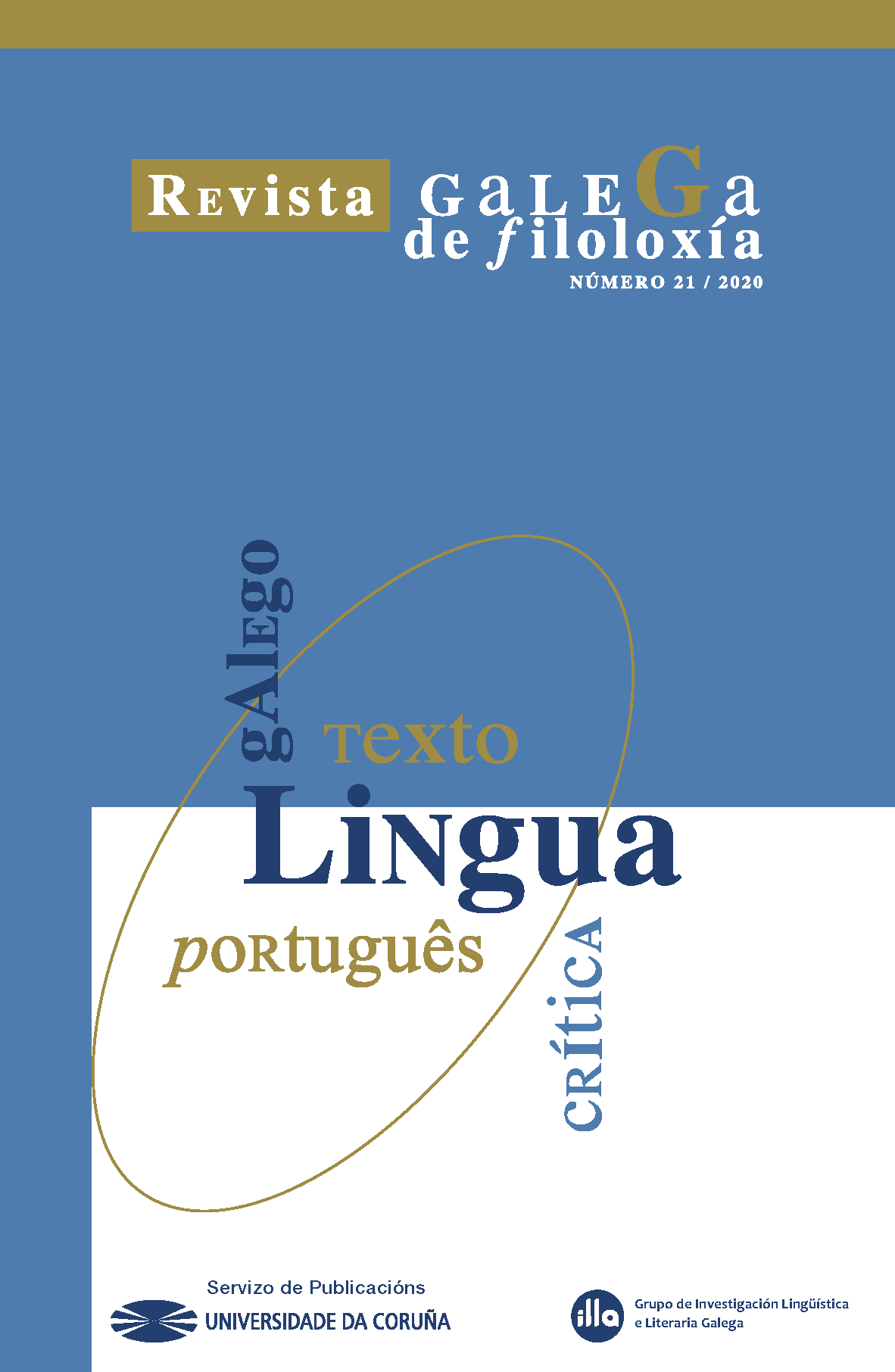New-speakerness in Compulsory Secondary Education: an unlegitimized space
Main Article Content
Abstract
After forty years of officialization of the Galician language, statistical data show that both the educational model and the other mechanisms of linguistic normalization have failed. Linguistic substitution is beginning to spread to villages and rural areas with a homogenizing hegemony. The role of secondary education for the future of Galician acquires, therefore, an even greater responsibility than it already had.
This article studies the role, difficulties and problems of teaching in a Galician region to promote the activation of linguistic awareness and the subsequent conversion or newspeakerness in the field of secondary education. To this end, the qualitative method of the discussion group is applied to all secondary school teachers in a Galician region. This led to the conclusion, among others, that a passive teaching model can function as a deactivating agent for the Galician language.
After presenting the state of affairs and the objectives, to analyse and show the most relevant data and end, in the fifth section, with the conclusions and our proposals.
Keywords:
Downloads
Metrics
Article Details
References
Atkinson, David (2018). “New Speakers and Linguistic Practices: Contexts, Definitions, and Issues”. En Smith-Christmas, Cassie, Murchadha, Noel P. Ó, Hornsby, Michael, Smith-Christmas, Cassie, & Moriarty, Máiréad (eds.), New Speakers of Minority Languages: Linguistic Ideologies and Practices, 271-282. London: Palgrave Macmillan.
Bourdieu, Pierre (1985). ¿Qué significa hablar? Economía de los intercambios lingüísticos. Madrid: Akal.
Callejo, Javier (2001). El grupo de discusión: introducción a una práctica de investigación. Barcelona: Ariel.
Callejo, Javier (2002). “Grupo de discusión: la apertura incoherente”, Estudios de Sociolingüística 3 (1), 91-109.
Crenshaw, Kimberlé (1989). “Demarginalizing the Intersection of Race and Sex: A Black Feminist Critique of Antidiscrimination Doctrine, Feminist Theory and Antiracist Politics”, University of Chicago Legal Forum 1989 (1), 139-167. http://chicagounbound.uchicago.edu/uclf/vol1989/iss1/8 (consultado en 05-06-2020).
Cros, Edmond (2009). La sociocrítica. Madrid: Arco Libros.
Del Val, Consuelo, & Gutiérrez, Jesús (2006). Prácticas para la comprensión de la Realidad Social. Madrid: McGraw W-Hill/Interamericana de España.
Fernández Paz, Agustín, Lorenzo, Anxo M., & Ramallo, Fernando (2008). A planificación lingüística nos centros. Compostela: Xunta de Galicia.
Freixeiro Mato, Xosé Ramón (2002, 1997). Lingua galega: normalidade e conflito. Compostela: Laiovento.
Instituto Galego de Estatística (2019). Enquisa estrutural a fogares. Coñecemento e uso do galego 2018. Compostela: IGE. http://www.ige.eu/web/mostrar_paxina.jsp?paxina=003&idioma=gl (consultado en 08.06.2020).
Jaffe, Alexandra (2015). “Defining the new speaker: theoretical perspectives and learner trajectories”, International Journal of the Sociology of Language, 231, 21-44. DOI: https://doi.org/10.1515/ijsl-2014-0030
Kováčová-Moman, Vlasta (2007). Mudança da língua usual nos novos locutores de galego – neofalantes. Santiago de Compostela: GZe-editora.
McLeod, Wilson, & O’Rourke, Bernadette (2015). “«New speakers» of Gaelic: perceptions of linguistic authenticity and appropriateness”, Applied Linguistics Review, 6(2), 151-172. DOI: https://doi.org/10.1515/applirev-2015-0008
Moralejo, Rubén, & Ramallo, Fernando (2019). “Las condiciones del (pre)neofalantismo y el proceso de conversión lingüística en Galicia”. En Ramallo, Fernando, Amorrortu, Estíbaliz, & Puigdevall, Maite (eds.), Neohablantes de lenguas minorizadas en el Estado español, 165-183. Madrid-Frankfurt am Main: Iberoamericana-Vervuert.
O’Rourke, Bernadette, & Pujolar, Joan. (2013). “From native speakers to “new speakers” —Problematizing nativeness in language revitalization contexts”, Histoire Épistémologie Langage, 35(2), 47-67. https://www.researchgate.net/publication/286952578_From_native_speakers_to_new_speakers_Problematizing_nativeness_in_language_revitalization_contexts (consultado en 07-06-2020)
Ortega, Ane, Amorrortu, Estibaliz, Goirigolzarri, Jone & Urla, Jacqueline (2016). Los nuevos hablantes de euskera: experiencias, actitudes e identidades. Bilbo: Publicaciones de la Universidad de Deusto, Bizkailab.
Padín, Paulo (2019). “Neofalantes online”. En Ramallo, Fernando, Amorrortu, Estíbaliz & Puigdevall, Maite (eds.), Neohablantes de lenguas minorizadas en el Estado español, 147-164. Madrid-Frankfurt am Main: Iberoamericana-Vervuert.
Pujolar, Joan, & Puigdevall, Maite (2015). “Linguistic mudes: how to become a new speaker in Catalonia”, International Journal of the Sociology of Language 231, 167–187. DOI: https://doi.org/10.1515/ijsl-2014-0037
Pujolar, Joan, González, Isaac, & Martínez, Roger (2010). “Les mudes lingüístiques dels joves catalans”, Llengua i ús: revista tècnica de política lingüística 48, 65-75.
Ramallo, Fernando (2013). “Neofalantismo”. En Gugenberger, Eva, Monteagudo, Henrique, & Rei-Doval, Gabriel (eds.), Contacto de linguas, hibrididade, cambio: contextos, procesos e consecuencias, 247-259. Compostela: Consello da Cultura Galega, Instituto da Lingua Galega. http://consellodacultura.gal/publicacion.php?id=2065 (consultado en 05.06.2020)
Ramallo, Fernando (2018). “A Galicia neofalante”, A trabe de ouro 111, 69-76.
Ramallo, Fernando (2019). “Entre a metamorfose e o fetiche: problematizando a lingua na Galicia actual”, A trabe de ouro 111, 69-76.
Ramallo, Fernando (2020). “Neofalantismo y el sujeto neohablante”. En Martín Rojo, Luisa, & Pujolar, Joan (eds.), Claves para entender multilingüismo contemporáneo, 229-265. Barcelona: Universitat Oberta de Catalunya.
Ramallo, Fernando, & O’Rourke, Bernadette (2014). “Perfiles de neohablantes de gallego”, Digithum 16, 98-105. DOI: http://dx.doi.org/10.7238/d.v0i16.2300 (consultado en 15.06.2020)
Ramallo, Fernando, Amorrortu, Estibaliz, & Puigdevall, Maite (eds.) (2019). Neohablantes de lenguas minorizadas en el Estado español, Madrid-Frankfurt, Iberoamericana-Vervuert.
Rodríguez-Yáñez, Xoán Paulo (2018). “A investigación do bilingüismo: seis paradigmas históricos producidos desde a sociolingüística”. En Alén Garabato, Carmen, & Brea, Mercedes (coords), Limba noastra-i o comoara...: sociolingüística románica en homenaxe a Francisco Fernández Rei, 97-115. Compostela: Universidade de Santiago de Compostela.
Suárez Ortega, Magdalena (2005). El grupo de discusión. Una herramienta para la investigación cualitativa. Barcelona: Laertes.


